THE FUTURE OF CONTINENTAL
PHILOSOPHY OF RELIGION
INDIANA SERIES IN THE PHILOSOPHY OF RELIGION
Merold Westphal, editor
THE FUTURE OF CONTINENTAL
PHILOSOPHY OF RELIGION
Edited by
Clayton Crockett
B. Keith Putt
Jeffrey W. Robbins

This book is a publication of
Indiana University Press
Office of Scholarly Publishing
Herman B Wells Library 350
1320 East 10th Street
Bloomington, Indiana 47405 USA
iupress.indiana.edu
Telephone 800-842-6796
Fax 812-855-7931
2014 by Indiana University Press
All rights reserved
No part of this book may be reproduced or utilized in any form or by any means, electronic or mechanical, including photocopying and recording, or by any information storage and retrieval system, without permission in writing from the publisher. The Association of American University Presses Resolution on Permissions constitutes the only exception to this prohibition.
 The paper used in this publication meets the minimum requirements of the American National Standard for Information SciencesPermanence of Paper for Printed Library Materials, ANSI Z39.48-1992.
The paper used in this publication meets the minimum requirements of the American National Standard for Information SciencesPermanence of Paper for Printed Library Materials, ANSI Z39.48-1992.
Manufactured in the United States of America
Library of Congress Cataloging-in-Publication Data
The future of continental philosophy of religion / edited by Clayton Crockett, B. Keith Putt, and Jeffrey W. Robbins.
pages cm. (Indiana series in the philosophy of religion)
Includes bibliographical references and index.
ISBN 978-0-253-01383-5 (cloth : alk. paper) ISBN 978-0-253-01388-0 (pbk. : alk. paper) ISBN 978-0-253-01393-4
(ebook) 1. ReligionPhilosophy. 2. Continental philosophy.
I. Crockett, Clayton, [date] editor of compilation.
BL51.F88 2014
210dc23
2013046586
1 2 3 4 5 19 18 17 16 15 14
Contents
/ Clayton Crockett, B. Keith Putt, and Jeffrey W. Robbins
/ John D. Caputo
/ B. Keith Putt
Response by Merold Westphal
Response by John D. Caputo
/ Edward F. Mooney
/ Steven Shakespeare
/ Leon Niemoczynski
/ Katharine Sarah Moody
/ Philip Goodchild
/ Devin Singh
/ Gavin Hyman
/ Joseph Ballan
/ Christina M. Gschwandtner
/ Nolle Vahanian
/ Catherine Malabou
/ Randall Johnson
/ Jeffrey W. Robbins
/ John Thibdeau
/ Lenart kof
/ Irving Goh
/ Clayton Crockett
Acknowledgments
THE EDITORS WANT to thank Dee Mortensen at Indiana University Press, and Merold Westphal, editor of the Indiana Series in the Philosophy of Religion, for their interest in and commitment to this book. We also want to acknowledge the origin of this project, and many of the chapters, at the Postmodern Culture and Religion 4 Conference held at Syracuse University in April 2011. Thanks to everyone who presented at, participated in, and attended this conference, and special thanks to Jack Caputo for asking us to form a committee to read and evaluate paper submissions, as well as put together the conference program. As the final PCR conference, it is a fitting culmination of Caputos conferences at Villanova and at Syracuse, and a genuine turning toward a future for Continental philosophy of religion, if there is one. Finally, we want to thank Deborah Pratt for her tireless work before, during, and after the conference and David Matusek for his work on the index.
THE FUTURE OF CONTINENTAL
PHILOSOPHY OF RELIGION
Introduction
Back to the Future
Clayton Crockett, B. Keith Putt, and Jeffrey W. Robbins
THE FUTURE HAS always figured prominently in Continental philosophy of religion. Indeed, we might even say that the (relatively short) history of Continental philosophy of religion has been defined by the future. So by way of introduction, our task will be to chart the concept of the future that has animated, inspired, and propelled this burgeoning discourse, which, by our reckoning, has both come into its own and reached a turning point, if not a terminal point or a fork in the road. Put otherwise, by posing the question of the future of Continental philosophy of religion, we are posing not only the possibility of a different future than the specific conception of the future that has heretofore been determinative, but also the possibility of overlapping futures, and thus, an alternative conception of timenot only a future structured by diffrance, but a plurality of temporalities that makes genuine change and difference possible.
We are asking this question now because now is precisely the time when different futures are appearing on the horizon with the intention of sparking still different thoughts about what the future might hold, and what hold the future might still have on what is a relatively young discourse. So, for instance, what comes next after the death of the generation consisting of Derrida, Deleuze, Foucault, and Levinasthe so-called 68ers? Is there a future afterlife for those thinkers who have left such a deep impact on Continental philosophy of religion? Or after the 68ers, or even after the afterlife of the 68ers, what new constellations of thinkers or movements will be most determinative in shaping the future of Continental philosophy of religion? Secondly, is there a politics of Continental philosophy of religion? Does Continental philosophy of religion have its very own political theology? It is with this question that the concepts of liberation and sovereignty get embroiled with money and capitalism, or with Western culture more generally, leading inexorably to the question of whether there is a home for postcolonialism within Continental philosophy of religion? Or is Continental philosophy of religion still awaiting its own liberation, and maybe even its own decolonization? Thirdly, with whom or what is Continental philosophy of religion in conversation? In what ways do the burgeoning discourses on speculative realism, the new materialism, and the new findings in the neurosciences and evolutionary psychology open new pathways for thought?
The above sentiment and questions give this volume birth. By speculating on the future, the volume is marking the time of the present as a time of transitiona time of overlapping and, frequently, contesting futures. What we can tentatively say about this future is that it is both radically open and highly determined. This is not a contradiction. On the contrary, it is because the future is overly determined that it can be understood to be open. The future is not a blank slate and does not open up into an empty void. Instead, what we will see is that the future of Continental philosophy of religion has a determinate past. We might even say that it has a pedigreea DNA that is known by its names, styles of thought, and problems both known and unknown. This pedigree opens up future possibilities even as it determines access. Continental philosophy of religion has heretofore has been largely a deconstructive and post- (if not anti-) metaphysical philosophy. Its preferred methodology has been that of phenomenology, its ethics an ethics of radical alterity, and as for its politics, or whether there could even be a politics of Continental philosophy of religion, that was a question left to others.
The above situation explains why it is only now that the future of Continental philosophy of religion can be asked, now that that single determinate future has been punctured. To put it bluntly: if deconstructive philosophy has been the de facto philosophy of Continental philosophy of religion, that path forward will now have to be forged
Next page

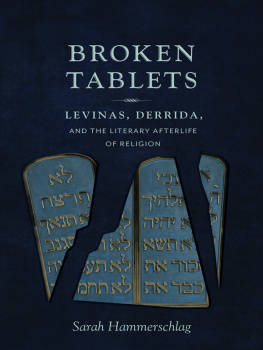
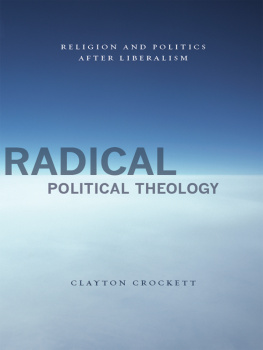
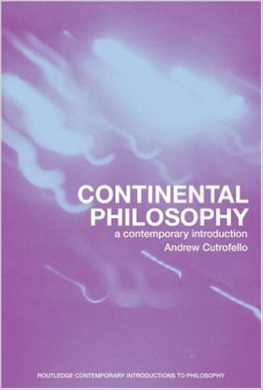
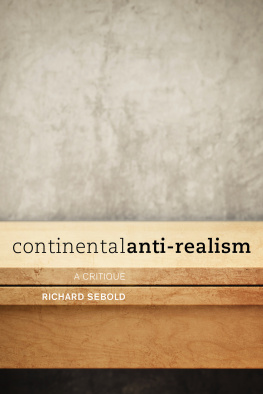
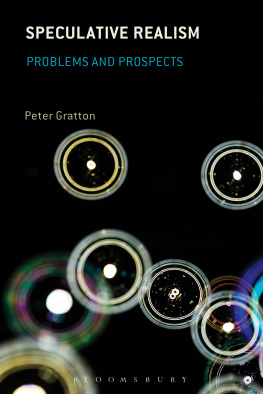

 The paper used in this publication meets the minimum requirements of the American National Standard for Information SciencesPermanence of Paper for Printed Library Materials, ANSI Z39.48-1992.
The paper used in this publication meets the minimum requirements of the American National Standard for Information SciencesPermanence of Paper for Printed Library Materials, ANSI Z39.48-1992.